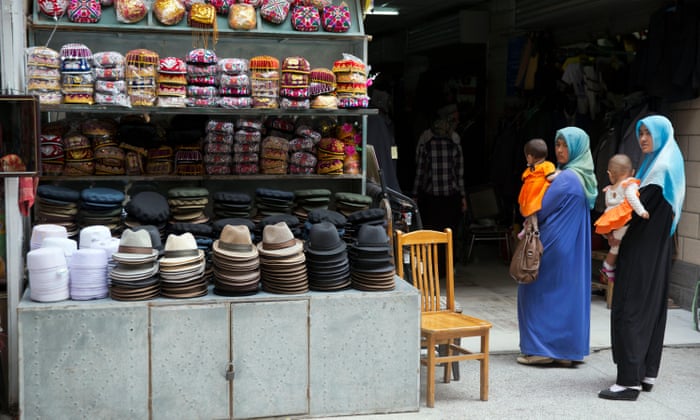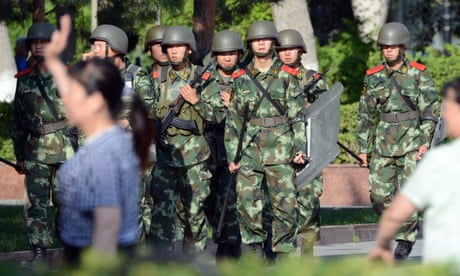Hong Kong -- It's a Christmas battle for the hearts and souls of the Chinese people.
Despite being officially atheist and having a long and antagonistic relationship with religion, the ruling Communist Party is presiding over a boom of Christianity in China.
There are an estimated 72 million to 92 million Christians in the country -- the second-largest faith group after Chinese Buddhists, according to US-based NGO Freedom House.
Some experts claim that China could even become the world's largest Christian country in less than two decades.
Yet on December 9, authorities detained more than 100 Protestant worshipers from the Early Rain Covenant Church in the city of Chengdu.
The church's pastor, Wang Yi, was arrested on allegations of "inciting subversion of state power," according to US-based Christian advocacy group ChinaAid.
Neither China's National Religious Affairs Administration nor local authorities in Chengdu responded to CNN's requests for comment on the case.
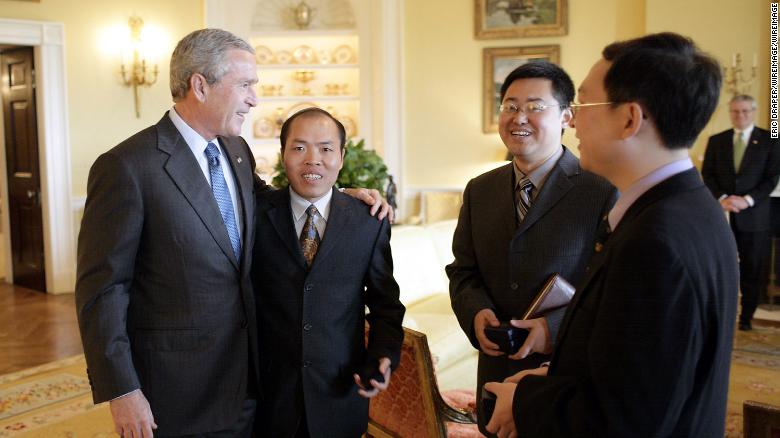
Then US President George W. Bush meets with Christian activist Wang Yi (middle) in 2006.
"My particular concern now for China is they've increased these actions of persecution against the faith community," Sam Brownback, Washington's ambassador at large for international religious freedom, said earlier this month.
In an interview with Reuters in November, China's ambassador to the US, Cui Tiankai, said the camps were trying to turn the Muslim-majority inmates into "normal people."
Chinese authorities have refused to grant international monitoring groups and diplomats access to East Turkestan.
While other communist regimes have also been hostile to religion, Johnson said the crackdown on Christianity and Islam was less about the faiths' practices and beliefs and more about the China's ability to control them.
"Under Xi Jinping, the government has further tightened control over Christianity in its broad efforts to 'Sinicize' religion or 'adopt Chinese characteristics' -- in other words, to ensure that religious groups support the government and the Communist Party," Human Rights Watch said in a statement calling for the release of Wang Yi, the Chengdu pastor, and his fellow believers.
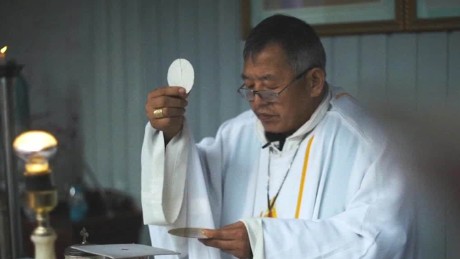
China, Vatican deal a 'betrayal'
While some Christians worship legally in government-approved churches, many others attend unregistered underground services.
State-sanctioned Catholic churches are run by bishops chosen and ordained by Beijing, not the Vatican.
After decades of chilly relations, the two sides reached a landmark provisional agreement in September that would see them jointly approve China's bishops, a deal that could help lead to the restoration of diplomatic ties between Beijing and the Holy See.
It has drawn swift opposition in Catholic circles.

Then US President George W. Bush meets with Christian activist Wang Yi (middle) in 2006.
The arrests cap a year-long crackdown on religion in China.
Dozens of predominantly Protestant Christian churches ruled to have been built or run illegally have been torn down across the country throughout 2018.
Elsewhere, in the western region of East Turkestan, a growing campaign of repression against the predominantly Muslim Uyghur ethnic group has provoked international condemnation.
Analysts and civil rights advocates say Beijing is intensifying its campaign against worshipers seen as an ideological threat to the party's monopoly on power.
"We are now entering a new era of repression toward two of China's five religions, which is different than what we've seen over the past 40 years," said Ian Johnson, a Pulitzer-prize winning journalist and author of "The Souls of China: The Return of Religion After Mao."
Religion with Chinese characteristics
China is officially an atheist state, and religious practice is under tight government supervision and surveillance.
There are only five state-recognized faiths: Chinese Buddhism, Islam, Catholicism, Protestantism and Taoism.
Worship and religious activity are supervised by state-sanctioned organizations.
Elsewhere, in the western region of East Turkestan, a growing campaign of repression against the predominantly Muslim Uyghur ethnic group has provoked international condemnation.
Analysts and civil rights advocates say Beijing is intensifying its campaign against worshipers seen as an ideological threat to the party's monopoly on power.
"We are now entering a new era of repression toward two of China's five religions, which is different than what we've seen over the past 40 years," said Ian Johnson, a Pulitzer-prize winning journalist and author of "The Souls of China: The Return of Religion After Mao."
Religion with Chinese characteristics
China is officially an atheist state, and religious practice is under tight government supervision and surveillance.
There are only five state-recognized faiths: Chinese Buddhism, Islam, Catholicism, Protestantism and Taoism.
Worship and religious activity are supervised by state-sanctioned organizations.
The government appoints major religious leaders and decides where places of worship can be built.
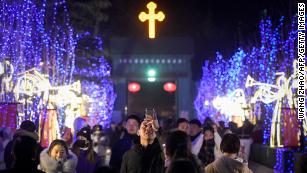 Detention of 100 Christians raises concerns about religious crackdown in China
Detention of 100 Christians raises concerns about religious crackdown in China
 Detention of 100 Christians raises concerns about religious crackdown in China
Detention of 100 Christians raises concerns about religious crackdown in China
Worshipers must "uphold the principle that religions in China must be Chinese in orientation and provide active guidance to religions so that they can adapt themselves to the socialist society," according to a government white paper on religious freedoms published earlier this year.
The reason for these restrictions, Beijing claims, is that "foreign religions" such as Catholicism and Protestantism have "long been controlled and utilized by colonialists and imperialists."
China's fractious relationship with organized religion has a long history.
The reason for these restrictions, Beijing claims, is that "foreign religions" such as Catholicism and Protestantism have "long been controlled and utilized by colonialists and imperialists."
China's fractious relationship with organized religion has a long history.
In the mid-1800s, charismatic cult leader Hong Xiuquan declared himself the brother of Jesus Christ and launched a civil war against the ruling Qing dynasty.
At its height, his Taiping Heavenly Kingdom controlled huge swaths of China before it was eventually defeated by Imperial forces.
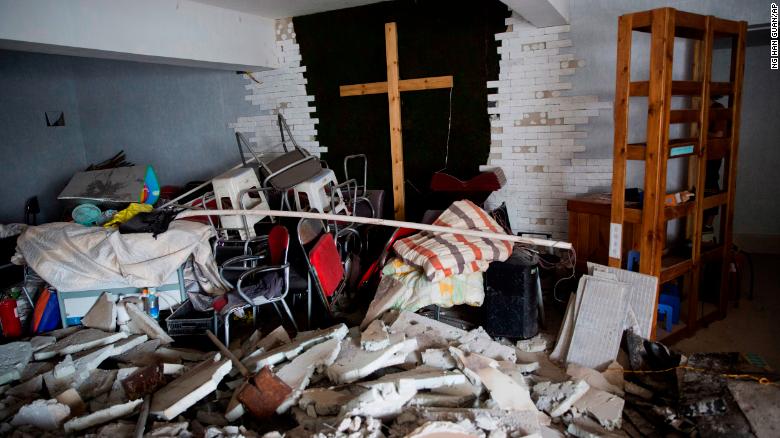
A demolished house church is seen in the city of Zhengzhou in central China's Henan province in June.
At its height, his Taiping Heavenly Kingdom controlled huge swaths of China before it was eventually defeated by Imperial forces.

A demolished house church is seen in the city of Zhengzhou in central China's Henan province in June.
Local spiritual and religious movements have also been subject to brutal crackdowns.
In 1999, China banned and moved to eradicate the Falun Gong spiritual movement, a faith combining traditional marital arts practices with new-age beliefs.
In 1999, China banned and moved to eradicate the Falun Gong spiritual movement, a faith combining traditional marital arts practices with new-age beliefs.
At its height, the Falun Gong claimed millions of followers -- and its influence worried the government.
Restrictions on worship help Communists mold religious institutions to their liking, or co-opt them altogether.
Christianity and Islam, Johnson said, are seen as particularly threatening because the party views them as having "strong foreign ties."
Restrictions on worship help Communists mold religious institutions to their liking, or co-opt them altogether.
Christianity and Islam, Johnson said, are seen as particularly threatening because the party views them as having "strong foreign ties."
"(That's) even though both religions have long roots in China and are very much localized," he added.
'Country of particular concern'
Outrage grew worldwide in 2018 over the treatment of Muslim-majority Uyghurs in East Turkestan, with hundreds of thousands have been imprisoned in massive concentration camps.
The clampdown on Uyghurs led the US State Department to designate China a "country of particular concern" regarding religious freedom.
'Country of particular concern'
Outrage grew worldwide in 2018 over the treatment of Muslim-majority Uyghurs in East Turkestan, with hundreds of thousands have been imprisoned in massive concentration camps.
The clampdown on Uyghurs led the US State Department to designate China a "country of particular concern" regarding religious freedom.
It comes after Chinese officials banned Uyghurs from growing long beards, wearing veils in public places and home schooling their children in 2017.
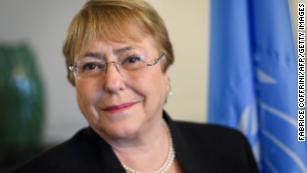 UN wants access to China's East Turkestan 're-education camps'
UN wants access to China's East Turkestan 're-education camps'
 UN wants access to China's East Turkestan 're-education camps'
UN wants access to China's East Turkestan 're-education camps'"My particular concern now for China is they've increased these actions of persecution against the faith community," Sam Brownback, Washington's ambassador at large for international religious freedom, said earlier this month.
"China isn't backing away from the religious persecution; it seems to be expanding. This is obviously very troubling."
Former detainees have reported torture and brainwashing inside the detention centers, including forcing inmates to repeat Communist Party propaganda praising Xi Jinping.
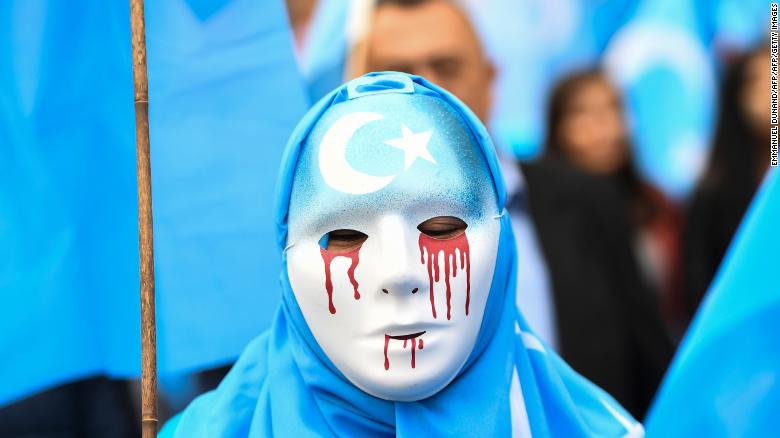
A person wearing a white mask with tears of blood takes part in a protest march of ethnic Uyghurs asking for the European Union to call upon China to respect human rights in the Chinese East Turkestan colony in April.
Former detainees have reported torture and brainwashing inside the detention centers, including forcing inmates to repeat Communist Party propaganda praising Xi Jinping.

A person wearing a white mask with tears of blood takes part in a protest march of ethnic Uyghurs asking for the European Union to call upon China to respect human rights in the Chinese East Turkestan colony in April.
In an interview with Reuters in November, China's ambassador to the US, Cui Tiankai, said the camps were trying to turn the Muslim-majority inmates into "normal people."
Chinese authorities have refused to grant international monitoring groups and diplomats access to East Turkestan.
While other communist regimes have also been hostile to religion, Johnson said the crackdown on Christianity and Islam was less about the faiths' practices and beliefs and more about the China's ability to control them.
"Under Xi Jinping, the government has further tightened control over Christianity in its broad efforts to 'Sinicize' religion or 'adopt Chinese characteristics' -- in other words, to ensure that religious groups support the government and the Communist Party," Human Rights Watch said in a statement calling for the release of Wang Yi, the Chengdu pastor, and his fellow believers.

China, Vatican deal a 'betrayal'
While some Christians worship legally in government-approved churches, many others attend unregistered underground services.
State-sanctioned Catholic churches are run by bishops chosen and ordained by Beijing, not the Vatican.
These churches do not recognize the Pope as the ultimate authority in Catholicism, nor does the Holy See recognize Chinese-selected bishops as legitimate.
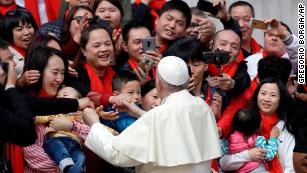 Opposition grows to controversial deal between Beijing and the Vatican
Opposition grows to controversial deal between Beijing and the Vatican
 Opposition grows to controversial deal between Beijing and the Vatican
Opposition grows to controversial deal between Beijing and the VaticanAfter decades of chilly relations, the two sides reached a landmark provisional agreement in September that would see them jointly approve China's bishops, a deal that could help lead to the restoration of diplomatic ties between Beijing and the Holy See.
It has drawn swift opposition in Catholic circles.
Cardinal Joseph Zen, the former bishop of Hong Kong, called it an "incredible betrayal" of the Catholic faith in an interview with Reuters.
Republican US Sen. Marco Rubio, himself a Catholic, asked how the Vatican could justify ceding religious authority to a secular government.
"They are giving a government (an atheist one) influence in choosing bishops which (the Church says) are regarded as transmitters of the apostolic line. How does secular (and atheist) interference in that decision not break that line?" Rubio said on Twitter.
It remains unclear how the Vatican deal will affect Protestant churches like Early Rain, but critics believe it comes from the same playbook as the arrests in Chengdu -- it's all about control.
"This goes back to a broader effort by the government to crack down on anything that can be construed as civil society -- in other words, groups like religious organizations, or NGOs, that are outside government control," Johnson said.
Republican US Sen. Marco Rubio, himself a Catholic, asked how the Vatican could justify ceding religious authority to a secular government.
"They are giving a government (an atheist one) influence in choosing bishops which (the Church says) are regarded as transmitters of the apostolic line. How does secular (and atheist) interference in that decision not break that line?" Rubio said on Twitter.
It remains unclear how the Vatican deal will affect Protestant churches like Early Rain, but critics believe it comes from the same playbook as the arrests in Chengdu -- it's all about control.
"This goes back to a broader effort by the government to crack down on anything that can be construed as civil society -- in other words, groups like religious organizations, or NGOs, that are outside government control," Johnson said.
